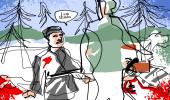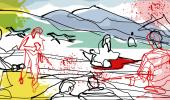'I'm not dismissing the anger that drives people to stomp on the enemy's flag.
'In times of collective grief and rage, that kind of expression is understandable, especially in the age of viral content.
'But must I do it too?' asks Nikhil Narayanan.

My X feed is full of videos showing people stomping on Pakistani flags -- painted or pasted onto roads and pathways.
More often than not, there's a bold Pakistan Murdabad written right next to it. People are stepping on these flags with purpose.
It's victory, jubilation, and defeating the enemy. Some are even ushering vehicles to drive over them.
The crowd is seen rejoicing, and social media is loving these clips.
In the aftermath of the Pahalgam terrorist attack, with our nation on the brink of a war-like situation, this act is being presented as the least a common citizen can do.
I understand that sentiment. But I have a reservation that's making me queasy. No, it's nothing unpatriotic.
My hesitation isn't political, but cultural. Many of us are conditioned from childhood not to step on books, paper, written text -- or even to drop them.
If a book slips from your hand, you instinctively pick it up and touch it to your forehead -- a mark of apology.
The same happens if your foot accidentally touches a newspaper. It's a learned reflex, deeply embedded in us, and almost involuntary.
We are taught to respect language, art, food, and symbols that carry meaning. Remember the lady from Bangalore who stepped on pookkalam during Onam, and the hate she received?
Such acts are abhorred; disrespecting our symbols -- nationalist or otherwise -- is unpardonable in our eyes.
That's during normal times. In emotionally charged moments like these, a wave of nationalism sweeps across, amplified by social media.
The feeling of anger and hate towards our adversary might have once been a private emotion -- not any longer.
It's a public performance now. If you feel something, you must record and post it to show the world how you feel.
What about the symbols of a nation we collectively hate?
I would never display them, but if I were asked to stamp on a Pakistani flag, I'm not sure I could bring myself to do it.
I could chant slogans, yes. But the very act of stamping on something with writing -- any writing -- triggers a conflict within me.
My hesitation isn't about national allegiance, but about a cultural value I've grown up with.
It's a moral dilemma. The spectacle of performative nationalism -- reels with vehicles driving over Pakistani flags on one side, and on the other, a quieter question: Do such performances defy our belief system?
The conviction of that belief system is as powerful as the nationalism on display.
Nationalism can coexist with our cultural values and beliefs. It's not a black-and-white situation.
For many Indians, the written word carries weight beyond its literal meaning.
Language and letters are intertwined with learning and divinity -- Goddess Saraswati, for instance, for Hindus.
The act of stepping on even a blank piece of paper feels wrong. Not because of what's written or not, but because something sacred is being defiled.
Across many faiths, written letters are sanctified, even if they're not from holy books.
Letters aren't just printed or painted ink. This isn't superstition. It's our value system. It's how we value even the seemingly insignificant.
So if I choose not to step on a Pakistani flag -- does that make me less patriotic? I don't think so.
Our personal codes of respect and belief come from deep within. They don't have to bend with the emotion of the moment.
The other day, I saw the Gunners emblem and the words Sarvatra Izzat-o-Iqbal -- our Artillery Regiment's motto -- outside the house of a retired officer in my neighbourhood.
I felt something stir in me. Not rage. Not revenge. But a deep, quiet pride.
A reminder that love for country doesn't always shout. Sometimes, it stands tall and dignified. That too is patriotism.
I'm not dismissing the anger that drives people to stomp on the enemy's flag. In times of collective grief and rage, that kind of expression is understandable, especially in the age of viral content.
But must I do it too?
That's a personal choice. Mine is to step back -- not because I care less, but because I care differently.
My anger runs deep enough that I won't even touch the enemy's flag with my foot.
Jai Hind ki Sena. Jai Hind.
Nikhil Narayanan is a marketer from Bangalore who writes at the intersection of observation and insight.
Feature Presentation: Aslam Hunani/Rediff.com










